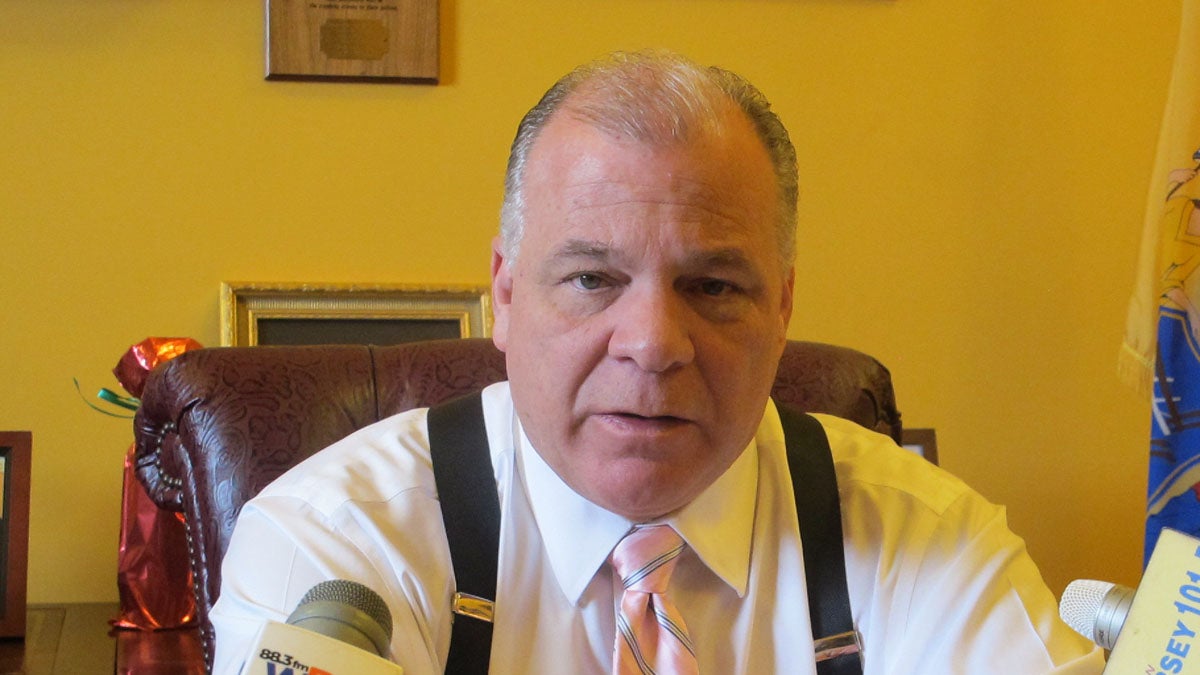Sweeney on Murphy budget: More savings, no millionaire’s tax
While Sweeney is praising Murphy for incorporating several savings initiatives into his 2020 spending plan, he said he will be pushing for more cuts.

New Jersey Senate President Steve Sweeney (Phil Gregory/WHYY)
This year’s state budget discussions seem to be off to a better start than last year, but that doesn’t mean Senate President Steve Sweeney is happy with everything that Gov. Phil Murphy proposed earlier this week in his budget message.
While Sweeney (D-Gloucester) and other top lawmakers are praising Murphy, a first-term Democrat, for incorporating several savings initiatives into his overall $38.6 billion spending plan for the 2020 fiscal year, Sweeney said he will be pushing for more cuts as the budget season plays out over the next few months.
Sweeney wants to see more dramatic changes to public-worker healthcare benefits and structural changes to the state pension system in the new state spending plan, which has to be in place by June 30 to avoid a government shutdown.
“Pension, healthcare, everything we can gather to reduce the burden to the taxpayers of the state, should be in this budget. It really should be,” Sweeney said during a wide-ranging interview at the State House yesterday.
The Senate leader also said he remains firmly opposed to Murphy’s renewed call for a millionaire’s tax and opposes adding new money for Murphy’s free community-college initiative.
Increase subsidy for mass transit
Sweeney also thinks the governor’s call for a net $25 million increase in the state’s operating subsidy for New Jersey Transit is too modest.
“I think, every year, honestly, they’ve got to add $100 million to it, with new money, to get transit to where it’s a world-class operation again because we rely so much on it,” he said.
At the same time, despite those significant policy differences, Sweeney suggested he’s hopeful that legislative leaders will be able to work more cooperatively with the governor to avoid a repeat of the acrimony that nearly led to a government shutdown last year.
“I don’t want to fight,” Sweeney said. “I want to get a budget done.”
More savings needed in benefit costs
One of the key elements of the FY2020 budget proposal that Murphy put forward Tuesday are changes to public-worker and retiree healthcare benefits that have the potential to save the state more than $800 million in FY2020. The savings initiatives, worked out cooperatively with union leaders, include utilizing Medicare Advantage plans for retired educators and putting tighter controls on employee prescription-drug and medical claims.
But Sweeney has for months been seeking more dramatic changes to public-worker and retiree healthcare plans, including a shift into an overall less-expensive health-insurance package — from the current “platinum” level to “gold” coverage. Architects of that proposal, which was included in a report issued last summer by a group of nonpartisan fiscal-policy experts, have estimated it could save taxpayers some $1.4 billion over the next four years.
“There’s a lot more savings to be had,” Sweeney said yesterday, pointing to healthcare benefits as one area that’s ripe for more dramatic reform. The Senate leader is also calling for the establishment of a new retirement system for public workers who aren’t yet vested in the state pension system. It would function as a less-costly, hybrid plan, offering features of both defined-benefit and defined-contribution systems.
While the savings wouldn’t be dramatic at first, Sweeney said they would help reduce the pension system’s huge unfunded liability, which tops $100 billion by some estimates.
Timing also an issue
The governor, though, has opposed any new pension changes until the state is fully funding its annual contribution, a goal that is still several years off, even though the FY2020 contribution will cost nearly $4 billion.
Sweeney was critical of that approach.
“Waiting until we make our full payment, and now you’re a lame-duck governor in your second term, you will find out no one is going to turn around and say ‘Sure, I’ll change everything now.’” It doesn’t work that way,” Sweeney said.
“People want to criticize what I’m doing, but no one (else) is offering a plan,” Sweeney also said.
Finding more savings could also provide the NJ Transit funding increase that Sweeney is seeking. In addition, money from Murphy’s millionaire’s tax proposal, which would generate nearly $450 million in new revenue, can only be used for property-tax relief under language written into the state constitution.
“The bottom line is our economy is demanding that we come up with (more) funding for New Jersey Transit,” Sweeney said. “It actually hurts us when businesses are looking to come here and people are looking to move here.”
‘Acknowledgement of a mistake’
The new money Murphy is seeking for an expansion of his free community-college initiative that began in FY2019 totals just over $30 million. Sweeney thinks more than $20 million could be found first by allowing county-college workers to move into a different health-benefits group. If the proposal sounds familiar it’s because Sweeney tried to enact such a move legislatively last year but was blocked by Murphy.
“It passed both houses, and he vetoed it,” Sweeney said.
Despite their differences, Sweeney said it was a meaningful development that Murphy has a adopted a new, more cooperative approach to dealing with lawmakers this year. As proof, he pointed to the governor’s decision to accommodate a list of legislators’ spending priorities within the FY2020 budget. The same list was not in the governor’s FY2019 budget.
“I think it is an acknowledgement of a mistake that was made to include these things in the beginning,” Sweeney said. “I appreciate it.”
“I want to start getting our fiscal house in order, and if we can do that it’s great,” Sweeney said.
WHYY is your source for fact-based, in-depth journalism and information. As a nonprofit organization, we rely on financial support from readers like you. Please give today.




